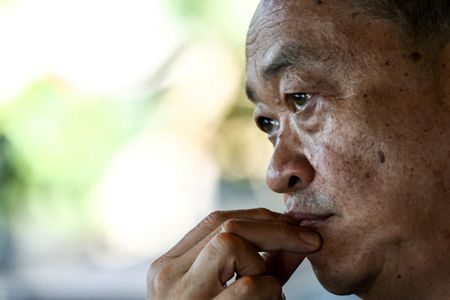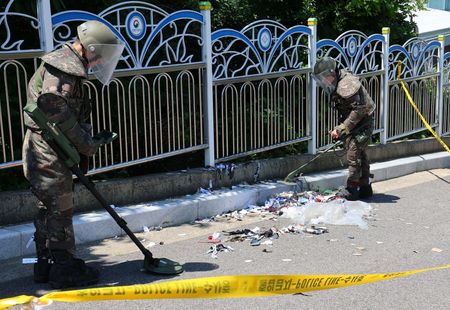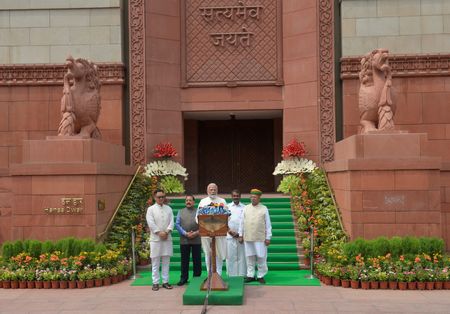BANGKOK (Reuters) -Thailand weathered a critical day of court cases on Tuesday, including those involving the fate of the prime minister and the main opposition, dodging an immediate political crisis in Southeast Asia’s second-largest economy.
Four cases before the courts involved the country’s most powerful politicians: Prime Minister Srettha Thavisin, former prime leader Thaksin Shinawatra, the popular opposition Move Forward party and upper-house lawmakers.
For decades, Thailand’s politics has been shaped by a struggle between its conservative-royalist establishment, supported by the military, and populist parties such as those backed by Thaksin and the current opposition Move Forward party.
“These cases highlight the fragility and complexity of Thailand’s political climate,” ANZ Research said in a note.
“On the economic front, the immediate concerns are the potential for disruptive protests and delays to fiscal policy implementation.”
HOW IS THE PRIME MINISTER INVOLVED?
Prime Minister Srettha Thavisin, a political novice who took office last August, has been accused by a group of conservative senators of breaching the constitution when he appointed a former lawyer with a conviction record to his cabinet.
Srettha, who denies any wrongdoing, could face dismissal if the Constitutional Court rules against him.
If Srettha is removed from office, a new government must be formed and his ruling Pheu Thai party would need to put forward a new candidate for premier to be voted on by parliament.
The court said on Tuesday that the next hearing in the case will be held on July 10.
WHAT IS THE CASE AGAINST THAKSIN?
Thaksin, the influential former premier who was ousted in a 2006 military coup, was formally indicted in a criminal court in Bangkok for allegedly insulting the royalty and other charges linked to a 2015 media interview on Tuesday.
A criminal court subsequently granted bail to the billionaire politician, who has said he is innocent, and instructed Thaksin to appear at an evidence review and hearing on August 19.
“He did not commit any wrongdoing,” Thaksin’s lawyer Winyat Chatmontre told reporters on Tuesday.
Thailand’s lese-majeste law, one of the world’s toughest, carries a maximum jail sentence of up to 15 years for each perceived royal insult.
The 74-year-old returned to Thailand to a rock star’s reception last August after 15 years of self-imposed exile.
Hours after his arrival, Shinawatra family-backed Pheu Thai and Srettha sailed through a parliamentary vote to pick the prime minister, fuelling speculation that Thaksin had struck a deal with his former enemies in the conservative establishment.
Thaksin and the Pheu Thai party have denied this.
IS THE OPPOSITION UNDER THREAT?
Another case could lead to the dissolution of the progressive Move Forward party, which has 30% of seats in the lower house after winning last year’s closely-fought election but was blocked by conservative lawmakers from forming a government.
The dissolution of Move Forward’s predecessor party, Future Forward, in 2020 over a campaign funding violation was among the factors that triggered massive anti-government street protests.
The Constitutional Court is considering an Election Commission complaint that alleges the Move Forward party breached the constitution with an election campaign to reform the country’s royal insult law.
Move Forward, which denies any wrongdoing, ceased efforts to change the law following a January verdict from the same court that ruled the party’s plan to amend the law was a hidden effort to undermine the monarchy.
The court set the next hearing for the case on July 3.
WHAT ABOUT THE SENATE ELECTION?
The Constitutional Court also delivered a verdict on Tuesday on the ongoing selection of a new 200-member Senate, saying the complex, three-tier process was lawful.
If the process had been cancelled or delayed, it would have temporarily extend the term of military-appointed lawmakers who have been central in determining government formation, including last year’s manoeuvre to block Move Forward from forming a government.
The current upper house was hand-picked by the military following a 2014 coup that ousted an elected Pheu Thai government that had been led by Thaksin’s sister, who still lives in self-imposed exile.
(Reporting by Devjyot Ghoshal and Panu Wongcha-um; Editing by Michael Perry)










